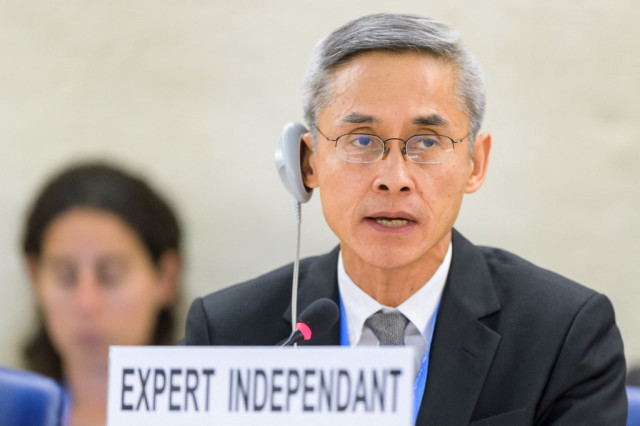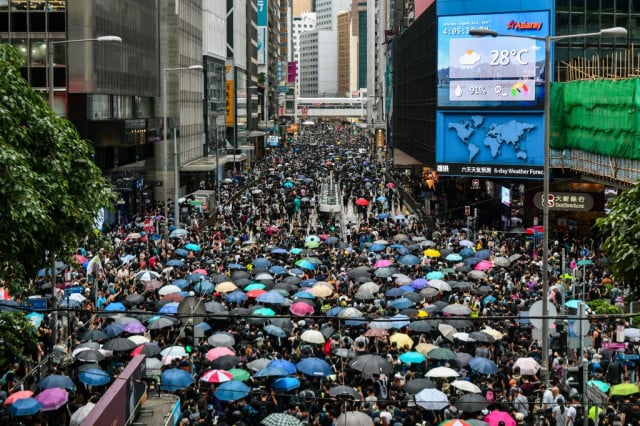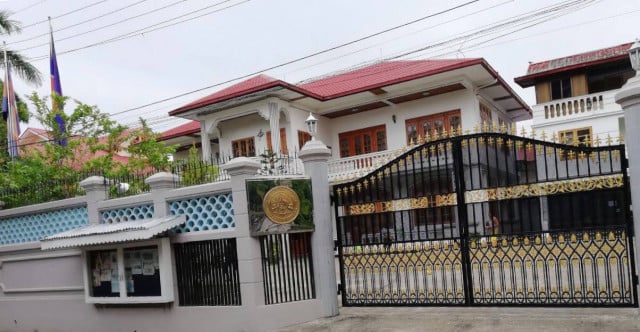Special Rapporteur: Civic Space “Shrinking, Shrunken, Shrunk” in Cambodia

- By Gerald Flynn
- October 7, 2021 4:09 PM
The UN Human Rights Council heard from Special Rapporteur Vitit Muntabhorn who warned that democratic space in Cambodia has been lost to a politicized judiciary run by an all-powerful executive
PHNOM PENH--Speaking at the UN Human Rights Council’s 48th session on Oct. 6, Vitit Muntabhorn—special rapporteur on the situation of human rights in Cambodia—said that recent years have seen “disturbing, deteriorating backsliding” in relation to the democratic space and respect for human rights in Cambodia.
It was the Oxford-educated Thai professor’s first report to the Human Rights Council since taking the role in March 2021 and Muntarbhorn’s opening remarks painted a grim picture of the state of democracy in Cambodia.
“Regression of the democratic space and civil and political rights and freedoms, interlinked with monopolization of power, has emerged as the most ostensible longitudinal issue,” he told the council. “Currently, the hermetic atmosphere caused by Executive superimposition is intimidating; it stifles the well-being of those who are perceived to be antithetical to the power base.”
Muntarbhorn stressed he has long been a friend to Cambodia, citing his advocacy work promoting the rights of Cambodian refugees who fled to Thailand in the 1980s, but noted that 30 years on from the Paris Peace Agreement, progress had been stunted in fulfilling the agreement’s promise of pluralistic democracy.
In his opening remarks, Muntarbhorn laid out what he called “interlinked challenges” to the advancement of human rights in Cambodia, starting with the COVID-19 pandemic which has strained the capacity of both the government and the healthcare system.
Persecution in the Pandemic
Cambodia’s response to the COVID-19 pandemic won praise for much of 2020 where the country escaped the grim fate of mass deaths and harsh lockdowns seen around the world, but following the Feb. 20 incident in 2021, a local outbreak spread rapidly, forcing the government to respond.
This response, however, was met with outcry at home and criticism from prominent rights groups internationally. The introduction of the COVID-19 Law on March 12 saw tough new measures and harsh penalties for those who failed to abide by them. The lengthy prison sentences and hefty fines threatened by the new law were deemed all the more alarming due to the vague language employed and, according to Muntarbhorn, more than 700 people had been arrested under the new law.
“Intolerance towards online criticism of the response of the authorities to the pandemic has led to arrests and prosecutions with a chilling impact on freedom of expression, leading to both self-censorship and censorship,” Muntarbhorn told the council.
Throughout the pandemic, journalists faced tighter restrictions when covering sensitive issues and were, for a brief time, banned from entering certain areas cordoned off as “Red Zones” where COVID-19 cases were soaring and food insecurity grew rife. The restrictions were applied forcefully, to the point where authorities were seen beating alleged rule-breakers with sticks on the streets of Phnom Penh, prompting Interior Minister Sar Kheng to step in and call for an end to the violence employed by authorities enforcing the new law.
“In recent years, there has been contraction of civic space—shrinking, shrunken, shrunk,” said Muntarbhorn. “Especially due to constraints on activities of human rights defenders, environmentalists and non-governmental organizations where they are seen to be critical of the authorities.”
While arrests soared in relation to the ever-shifting patchwork of COVID-19 restrictions—that have, consistently, been issued or altered at short notice—attacks on human rights defenders and critics of the government rose sharply in 2020, according to data from rights group LICADHO. The trend appears to have continued through 2021, with multiple high-profile arrests of prominent critics of the government—arrests that Muntarbhorn previously spoke out against.
He also condemned the government’s decision to arrest a 16-year-old boy—the son a jailed former opposition party member—who has autism, which the judge dismissed on the grounds that the boy knows how to use social media.
“Closed Political Environment”
Journalists, youth groups, environmentalists, musicians and monks were among those who fell afoul of Cambodia’s latest crackdown on critics, but, as has been a long-running trend for the past four years, the former opposition and their supporters were in the center of the government’s crosshairs. Mass trials, deemed too unwieldy to possibly offer due process, are ongoing for hundreds of people associated with the Supreme Court-dissolved Cambodia National Rescue Party (CNRP).
In his assessment of the government’s handling of political rivals, Muntarbhorn noted that democratic space is “non-existent” in Cambodia due to the “closed political environment.”
Much of the special rapporteur’s report was focused on the upcoming commune and national elections in 2022 and 2023 respectively, with Muntarbhorn warning that the elections “may take place without the existence of a viable opposition putting at risk the genuine right to participate in public affairs.”
The elections, he added, were especially at risk due to the National Internet Gateway, which is set to give the Cambodian government a kill-switch to internet access, but one that rights groups have said will allow the government—famous for its allergy to criticism—the chance to block access to critical reporting and information in Cambodia.
He went on to speak out against Cambodia’s judiciary, citing irregularities within trials and a lack of due process that only contributes to the country’s notoriously overcrowded prisons, many of which have not provided inmates with proper healthcare throughout much of the pandemic.
“Suspend draconian laws and reform them. Drop court cases and end the detention of those who disagree with the authorities. Restore political rights to members of the political opposition, and propel reconciliation. Share the power and end the monopoly. Respond well to vulnerabilities and the totality of civil, political, economic, social and cultural rights in times of COVID-19 and beyond,” said Muntarbhorn, concluding his opening remarks.
In response, Cambodia’s Permanent Representative at the UN An Sokkhoeurn hit back at the special rapporteur’s report, saying it was a “selective, biased and flawed account of Cambodia.”
Sokkhoeurn accused Muntarbhorn of “staying silent in the face of hate speech and populist rhetoric” which the Cambodian ambassador said came from the CNRP’s leadership, although he did not name either Sam Rainsy or Kem Sokha.
He went on to question the number of people arrested under the COVID-19 law, but did not offer his own or the government’s estimates.
Predictable International Responses
A total of 24 representatives from states who either sit on the Human Rights Council or are observer states then each spoke, with Brunei—whose representative also spoke on behalf of ASEAN—Vietnam, the Philippines, Lao PDR, Indonesia and Thailand all taking neutral stances and referencing the ASEAN policy of non-interference.
Representatives of Venezuela, North Korea, Russia, Belarus, Sri Lanka, Lebanon, Cuba, India, Cameroon, Turkey, Egypt, Azerbaijan and Kuwait all vocalized support for the Cambodian government to varying degrees, with the Belarusian representative questioning the role of the special rapporteur and the North Korean representative reminding Muntarbhorn the importance of adhering to a strict code of conduct as set out by international law.
China’s representative went further, claiming that Cambodia “effectively guarantees all human rights.”
Meanwhile, representatives from the EU, Iceland—whose representative also spoke on behalf of Nordic Baltic countries—Australia, Japan, France, Switzerland, the US, Belgium and the UK all praising the special rapporteur’s report and voicing concerns over the state of democracy and human rights in Cambodia, especially with regard to the forthcoming elections.
A number of human rights focused NGOs then took turns speaking, with Liberal International warning that COVID-19 has been used to crush dissent in Cambodia, while the International Federation for Human Rights called the situation in Cambodia “abysmal” and Lawyers Rights Watch Canada said that a monopoly of power is depriving people of their political rights and has effectively turned Cambodia into a one-party state.
Human Rights Watch called the current situation “the most restrictive in 30 years” while CIVICUS said the coming elections were “likely to take place in an environment unlikely to be conducive to free or fair elections,” following what Amnesty International referred to as “a relentless attack on civic space.”
Following similarly withering comments from 10 international human rights NGOs, Sokkhoeurn took the floor back, thanking states that had avoided saying anything negative about Cambodia’s approach to rights and democracy, before going on to claim that critics’ “grievances were coming from politically motivated and foreign-funded NGOs.
He added that former CNRP politicians have since formed smaller parties of their own, but neglected to mention the requirement of permission to undergo “political rehabilitation” granted by Prime Minister Hun Sen.
Sokkhoeurn then reiterated that “Crime is crime” and said that “human rights are not absolute” in response to the criticism of his government’s continued crackdown on dissent.
Muntarbhorn, wrapping up the session, urged the government to use civil law if it felt it absolutely had to use the judiciary to attack its critics, adding that an independent judiciary needed to be built.
“These things are said as friends and I’m very happy to help and to construct, with a view to the future in partnership,” he concluded.















